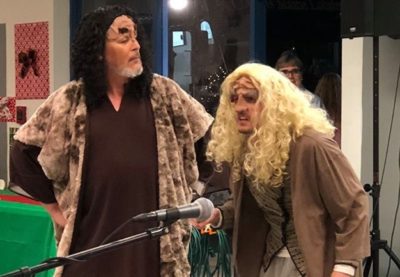A Klingon Christmas Carol makes its West Coast premiere Thursday, December 14, so we wanted to wrap up our three-part series on the show by getting into the weeds and talking with two of the actors appearing in the show. Nick D’Alberto plays the Scrooge equivalent and Paul Carpenter plays the ghosts of Christmas Present and Future. In addition to performing in the show, it fell to Carpenter to be the dialect coach for the other actors, since the Klingon language is so meticulously defined and must be represented accurately.
VCOS: Let’s start with Nick. Have you had any expertise with things Star Trek?
NICK: Nothing professionally Star Trek-related.
VCOS: Did you know what you were getting into when you signed up for this?
NICK: Well, I knew it would all be in Klingon, but I guess I wasn’t able to conceive what a massive undertaking it would be. It’s been really challenging, learning a whole new language in two months.
VCOS: In addition that that, you have this dichotomy going on within you where you are playing this very well-known character, Ebenezer Scrooge, and you have to combine two very disparate cultures into one. How do you reconcile those two as an actor?
NICK: The way I look at it, it’s almost an inversion of your typical Christmas Carol-type story. Instead of learning the value of compassion and caring for your fellow man, you are learning the true value of killing people and taking their stuff (laughs).
PAUL: Honor and courage.
NICK: But to a Klingon, what is honor? I’m stronger than you, so this is mine now. That’s how he thinks of it.
VCOS: Have you imbued this new Scrooge-like character with anything of your own?
NICK: I suppose there’s more of SQuja’ in me than I would care to admit. [spells his name] The capitalizations are important. Capitals are not necessarily at the beginning of proper nouns in Klingon.
VCOS: Paul, what are the key elements in knowing how to properly speak Klingon?
PAUL: One needs to put across the essential nature of being Klingon, with all the gutturals and “pro-ject-tile” speaking. One needs to hurl one’s words at another person.
NICK: It’s a very glottal language. There’s a lot of talking in the back of your throat. Very hard to project.
VCOS: Is it anything like German?
PAUL: Actually, it’s more like Japanese, but the Japanese are wayyyy more polite on the surface (laughs). I’m thinking perhaps that it’s more like the Japanese that the samurai spoke to each other.
VCOS: How are you able to handle your characters in addition to taking on the role of linguist for the production?
PAUL: I always have enjoyed language more than anything else, except maybe math. So this was an opportunity to be forced to learn a new language. I didn’t know that I was going to be anointed Language Captain, but I suppose after the fact, I was like “Ooh! Ooh! Let’s learn more! Let’s stay another three hours! Give us more homework, teacher!” So it was inevitable that I was going to be the lieutenant.
VCOS: How did you go about learning it?
PAUL: First was mastering the phonemes, the vowel sounds of the language, and then the guttural “ch” sounds and so forth. But the way I learn a new language is to break it down syntactically. I have a little cheat sheet that I keep with me that has the English translations and the parsing of each Klingon word, with the prefixes and suffixes and how they fit together for every one of my lines, just to make sure that I got the sense of what it was I was saying.
VCOS: What does DaHjaj mean? I see that on the script.
PAUL: Today. Literally. It means these are the lines to learn today.
VCOS: The title A Christmas Carol has to be translate also. How does that change?
NICK: It would be “Klingon Feast of the Long Night.”
VCOS: Have you encountered any serious Star Trek fans who have already seen this play and will be able to judge your effectiveness?
PAUL: Well, Chris, the author takes it seriously. He’s my language coach. I can’t say that the actual Klingons who we interacted with were like the Klingon Assault Group, these were very casual Klingons.
VCOS: What’s the Klingon Assault Group?
PAUL: It’s a social group who enjoy being Klingons.
NICK: Just a local club of people who are Star Trek fans. They identify particularly with Klingons; they dress up in costume for special occasions and functions.
PAUL: There are chapters of the Klingon Assault Group in many places all over.
VCOS: Are you expecting some of them to come see the show?
PAUL: We’re told that people will be flying in from as far away as Seattle and Minnesota and Washington D.C.
VCOS: Or transporting in.
PAUL: Yeah (laughs). I don’t know if that was meant to put the fear of Kahless into us so that we’d better pronounce every word correctly because there will be people here who speak this language fluently who are listening.
NICK: Do you mean that people who speak Klingon fluently might not have the best social skills?
PAUL: They might even storm the stage if we mispronounce a word! The penalties are great.
VCOS: Is this language offered as a college course anywhere?
PAUL: Yes, it is offered as a course, but I don’t think one can get college credit for it, though. But seriously, the Klingon Language Institute has three levels of proficiency and we’re not even quite at level one.
VCOS: Well, you’re using a limited vocabulary, only what is pertinent to the play.
PAUL: If I had my printouts with me, I’d show you a concordance of every root, every suffix, and every prefix that appears in the play. It runs several pages.
NICK: It’s not insignificant.
VCOS: Is there Klingonian background music that goes along with the story?
PAUL: Funny you should ask that. I don’t know what’s been settled upon, but in our language training, we learned three RamnI’tay carols, although I’m not sure you can call them carols. RamnI’tay means “feast of the long night.”
NICK: They’re Klingon translations of English Christmas carols.
PAUL: We also learned a Klingon march which is not related to Christmas, it’s just traditional Klingon, and I was surprised that the music sounded so tonal.
NICK: We got a copy of the CD soundtrack that they used for one of the original productions of the show. I don’t know how much of that we’re going to use.
PAUL: There are times when, as Christmas Present, I’m almost moved to tears. Isn’t that wonderful?
VCOS: Is it possible to be a jolly Ghost of Christmas Present in this show?
PAUL: That’s a very penetrating question. The way it’s written the Ghost of Christmas Present is more sarcastic and challenging than jolly, but at the same time, I really want the best for SQuja’ [lapses into Klingon]. C’mon! Man up, SQuja’!
NICK: He’s still very gregarious, though.
PAUL: I definitely have the loudest bellowing in the show.
********************
A Klingon Christmas Carol opens Thursday, December 14 at Santa Susana High School. For dates and showtimes, see the VC On Stage Calendar.






No Comments